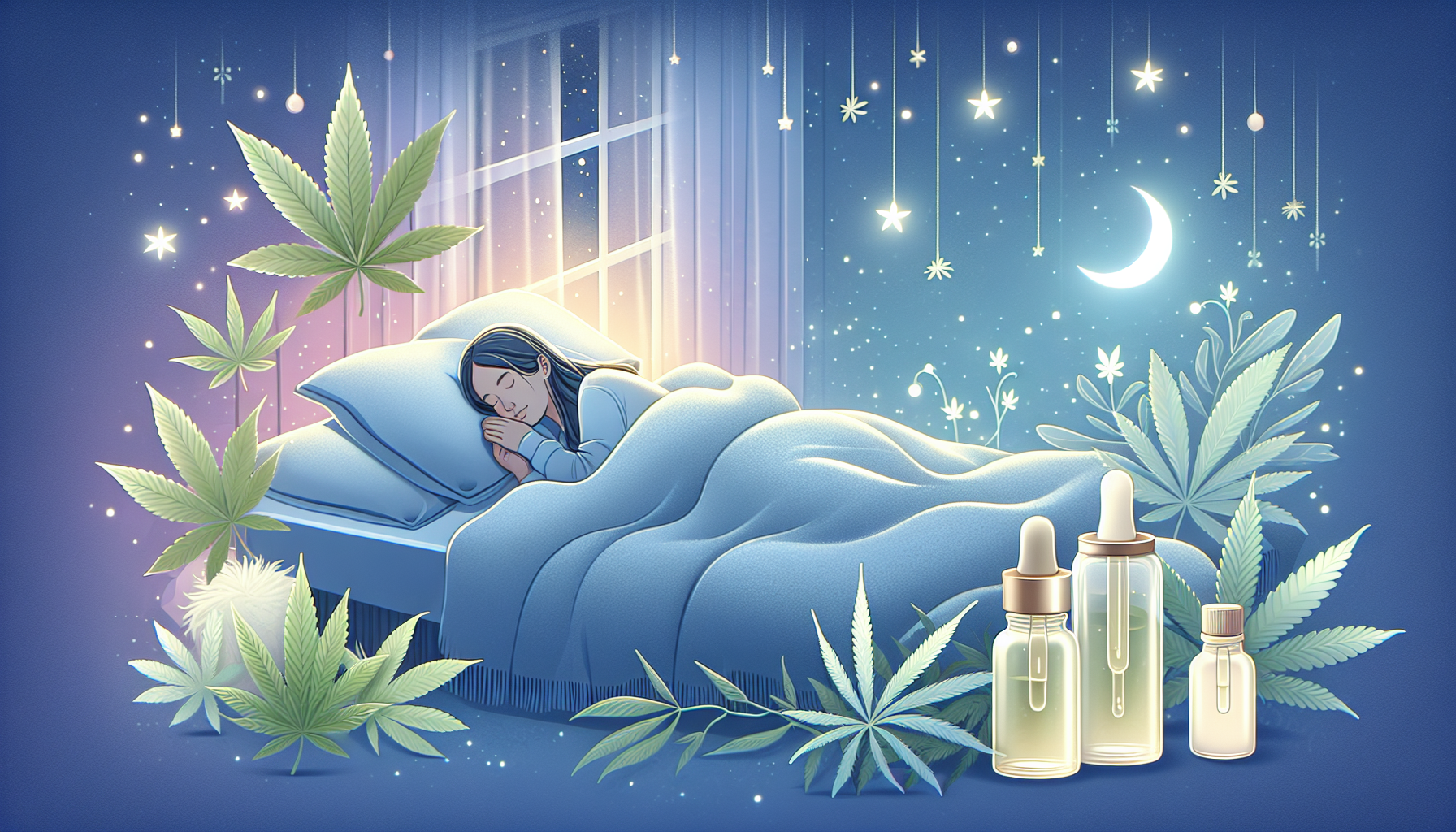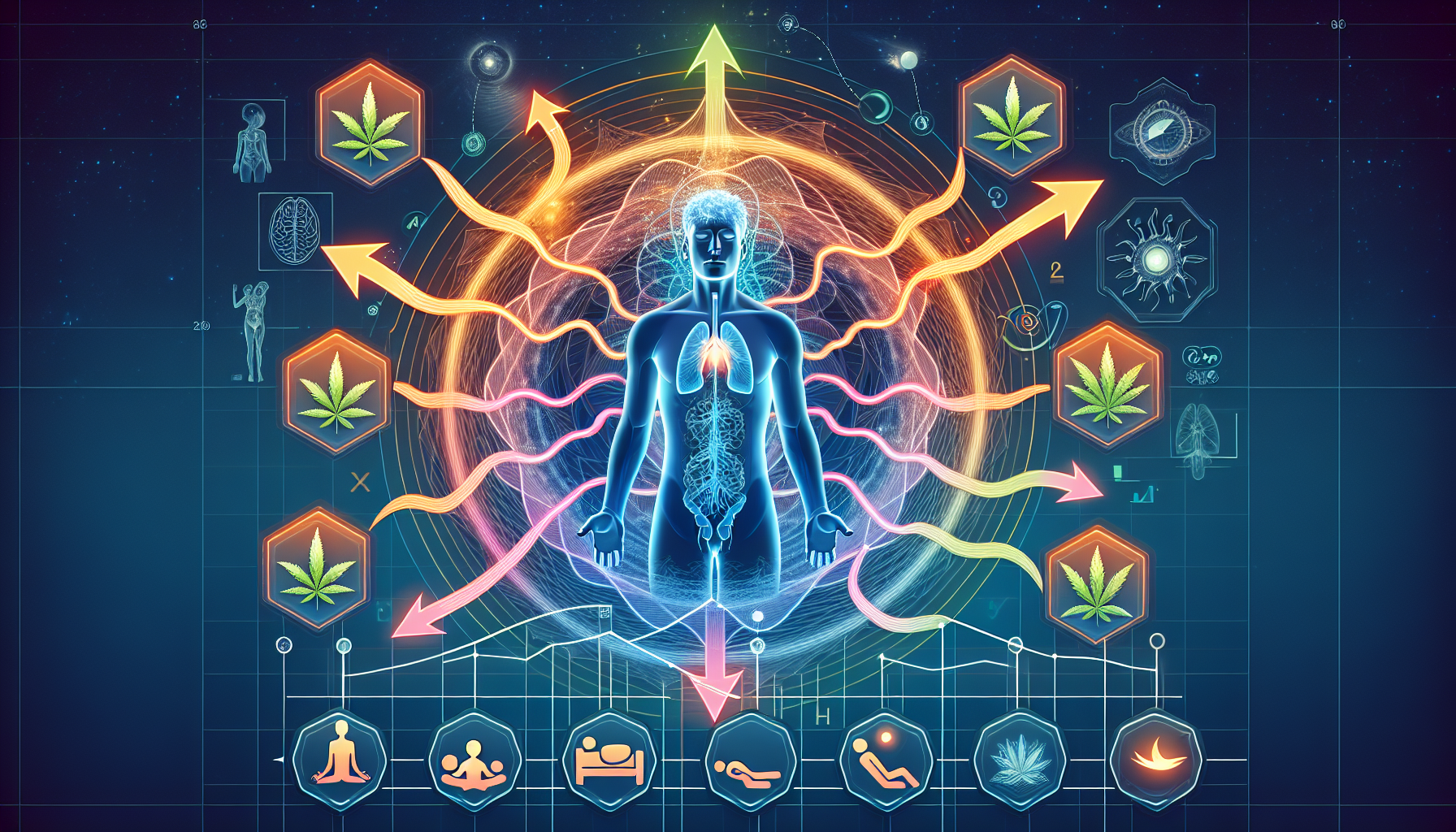CBD Sleep Disorder: How CBD Oil Can Improve Your Sleep
The most important things at a glance
-
CBD shows potential benefits in improving sleep quality, particularly sleep disorders caused by anxiety and stress.
-
Current studies on the effects of CBD on sleep disorders are insufficient and require randomized controlled trials for meaningful results.
-
Combining CBD with melatonin and a healthy diet can significantly improve sleep quality.
CBD Sleep Disorder: How CBD Oil Can Improve Your Sleep

CBD could be a valuable aid in dealing with sleep problems. It shows positive effects by having an antispasmodic and calming effect, which can be particularly helpful for sleep disorders caused by anxiety and stress. Using full-spectrum CBD oils can improve sleep quality, prevent insomnia and shorten the time it takes to fall asleep.
CBD products, such as sleep drops and oils, can help improve sleep quality and reduce the time it takes to fall asleep. This leads to more restful sleep and, in the long term, can help prevent sleep deprivation and the negative health effects associated with it.
introduction
CBD shows great potential for improving sleep quality due to its anti-anxiety properties. The effect of CBD on the endocannabinoid system can reduce stress and promote relaxation, which supports better sleep. Sleep is essential for our physical and mental health and significantly influences our quality of life.
Many people suffer from sleep problems, often made worse by stress and anxiety. CBD can help by providing a calming effect and relaxing the mind, helping you fall asleep faster and stay asleep.
Let's dive deeper and examine the scientific background as well as the personal experiences of users in life and in video.
CBD and its effect on sleep disorders

CBD can help with sleep disorders by providing calming and antispasmodic properties. These properties help improve sleep quality and can prevent insomnia. Full spectrum CBD oils offer improved sleep quality, shorten the time it takes to fall asleep and increase sleep duration.
The combination of CBD and full-spectrum oils can significantly help support restful sleep. Now let's take a look at the scientific studies that support these claims and the experiences of users who have used CBD to improve their sleep.
Scientific Studies on CBD and Sleep
Current research on CBD and sleep disorders shows that there is a lack of meaningful studies. The studies to date have significant methodological deficiencies, which leads to less meaningful results. Although it is often claimed that CBD improves sleep, no reliable evidence for this has been found.
Randomized controlled trials are needed to confirm the effect of CBD on sleep disorders. These studies would help to better understand and scientifically substantiate the actual benefits of CBD for sleep.
user experiences
Many people report positive experiences with CBD to improve their sleep quality. Lack of sleep can lead to reduced performance, difficulty concentrating, nervousness and anxiety. Users report that CBD has helped them to reduce these problems and find more restful sleep.
The physical consequences of sleep disorders include decreased ability to concentrate, persistent daytime fatigue, and an increased risk of mood problems. CBD can help alleviate these symptoms and improve quality of life by promoting a restful night's sleep.
Why sleep quality is important

Good sleep is crucial for the general health and well-being of body and mind. Restful sleep has a positive effect on your mood and spirits. Restful sleep also has the function of regenerating the body's structures and strengthening the immune system.
Lack of sleep can lead to reduced leptin and increased ghrelin concentrations, which regulate appetite. Long-term lack of sleep can lead to health risks such as overweight, obesity and type 2 diabetes mellitus.
Now let's look at the long-term effects of sleep deprivation and some tips for better sleep.
Long-term consequences of sleep deprivation
Chronic sleep deprivation can increase the risk of cardiovascular disease, which highlights the importance of achieving and maintaining good sleep quality. Sleep deprivation also increases the risk of obesity.
The effects of sleep deprivation are far-reaching and can cause long-term health problems, so it is crucial to take steps to improve sleep quality and prevent sleep deprivation.
Tips for Better Sleep
It should be well darkened at night to support melatonin production. Establishing sleep rituals, such as an hour of quiet before bed, can improve sleep quality. Listening to relaxing music before bed can also be helpful.
Herbal teas, such as chamomile and lavender, are often recommended to help relax and improve sleep quality. Foods high in tryptophan, such as bananas and nuts, can support the production of melatonin and thus sleep quality.
Eating foods with a high glycemic index, such as white rice and pasta, may make it easier to fall asleep if consumed one hour before bedtime.
CBD products for better sleep

CBD products such as oils, capsules and drops are specially formulated to improve sleep quality. The recommended daily dose for CBD VITAL sleep drops is 20 drops, which should be taken shortly before bedtime.
Taking CBD before bedtime can increase the relaxing effects and reduce the time it takes to fall asleep. An appropriate CBD dosage for sleep problems is often between 20 and 60 mg per day, depending on individual needs and the severity of the sleep disorder.
Now let’s take a look at the differences between full spectrum oils and isolates.
Full-spectrum oils vs. isolates
Full-spectrum CBD oils utilize the full range of cannabinoids, while CBD isolates are pure CBD without any other cannabinoids. This variety of cannabinoids and flavonoids can lead to a synergistic effect that promotes sleep quality.
CBD isolates are 98% pure CBD but do not contain any other cannabinoids or terpenes, which may limit their effects on sleep. Full-spectrum CBD oils contain other cannabinoids and terpenes in addition to cannabidiol, which may work synergistically, potentially improving sleep quality.
Dosage and Application
The correct dosage of CBD products can vary, requiring individual adjustment to achieve optimal results for sleep. It is recommended to start with a lower dosage and gradually adjust it to achieve the optimal effect.
People with liver disease may need to take CBD in lower doses to avoid damage. CBD oil can either be taken under the tongue or incorporated into food to support its effects on sleep.
Side effects and safety of CBD
CBD can cause unwanted effects, including dry mouth, low blood pressure, and drowsiness. These potential negative effects should be considered when using CBD. Combining CBD with sedatives can increase drowsiness and cause potentially dangerous side effects.
CBD can affect the way other medications work by speeding up or slowing down how they are broken down in the body. Therefore, it is important to consult a doctor before taking CBD, especially if you are taking other medications.
Interactions with other medications
Individuals with Parkinson's disease risk that high doses of CBD will worsen their symptoms. CBD can interact with various medications that require special caution.
It is advisable to consult a doctor before taking CBD, especially if you are taking other medications. This precaution will help avoid possible side effects and interactions.
Who should avoid CBD?
Certain groups of people should avoid CBD, especially pregnant and breastfeeding women. Using CBD during pregnancy or breastfeeding can potentially have negative effects on the health of the child, especially in relation to cannabis.
Pregnant and breastfeeding women should avoid CBD due to potential risks to the baby. It is important to heed these warnings to ensure the safety of both mother and child.
Other natural remedies for sleep disorders

Melatonin is a hormone that helps regulate the sleep-wake cycle and shortens the time it takes to fall asleep. Increased melatonin production is particularly stimulated in the dark, which helps prepare the body for sleep.
Natural remedies like melatonin and a targeted diet can help combat sleep disorders and improve sleep quality. Now let's take a closer look at how melatonin and diet can affect sleep.
Melatonin and sleep quality
Melatonin regulates the day-night rhythm, becomes active in the dark and promotes falling asleep. A well-darkened bedroom supports melatonin production and improves sleep. The combination of CBD and melatonin can promote relaxation and lead to better sleep.
CBD VITAL sleep drops contain a combination of hemp and melatonin to improve sleep quality. This blend can be particularly effective in both shortening the time it takes to fall asleep and improving overall sleep quality.
nutrition and sleep
A healthy diet has a positive effect on well-being and sleep. Certain foods can promote the production of sleep hormones. Foods high in tryptophan, such as bananas and nuts, support melatonin production and thus sleep quality.
Eating foods with a high glycemic index, such as white rice and pasta, can make it easier to fall asleep if consumed one hour before bedtime. A balanced diet plays an essential role in getting a good night's sleep and overall well-being.
Summary
In summary, CBD can be a promising option for improving sleep quality. Scientific studies still show gaps, but many users report positive experiences. It is important to find the right dosage and consider possible side effects.
Combining CBD with other natural remedies such as melatonin and a healthy diet can further improve sleep. Healthy sleep is crucial for our health and well-being. Try these tips and experience how you can make your nights restful again.
Frequently Asked Questions
Can CBD really help with sleep problems?
Yes, many users report that CBD can improve sleep quality due to its calming and antispasmodic properties. It therefore offers potential support for sleep problems.
What is the difference between full spectrum CBD and CBD isolate?
The difference between full-spectrum CBD and CBD isolate is that full-spectrum CBD oils contain all cannabinoids, while CBD isolates only offer pure CBD. This leads to different potencies and applications.
Is there scientific evidence for the effectiveness of CBD for sleep disorders?
There is not yet sufficient scientific evidence to support the effectiveness of CBD for sleep disorders, so further research is needed.
What side effects can occur when using CBD?
Side effects such as dry mouth, low blood pressure and drowsiness may occur when using CBD. It is important to be aware of these possible effects.
Who should avoid CBD?
CBD should be avoided by pregnant and breastfeeding women and people taking certain medications, or should only be used after consulting a doctor.
